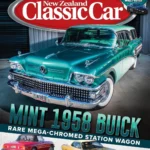Latest news and features
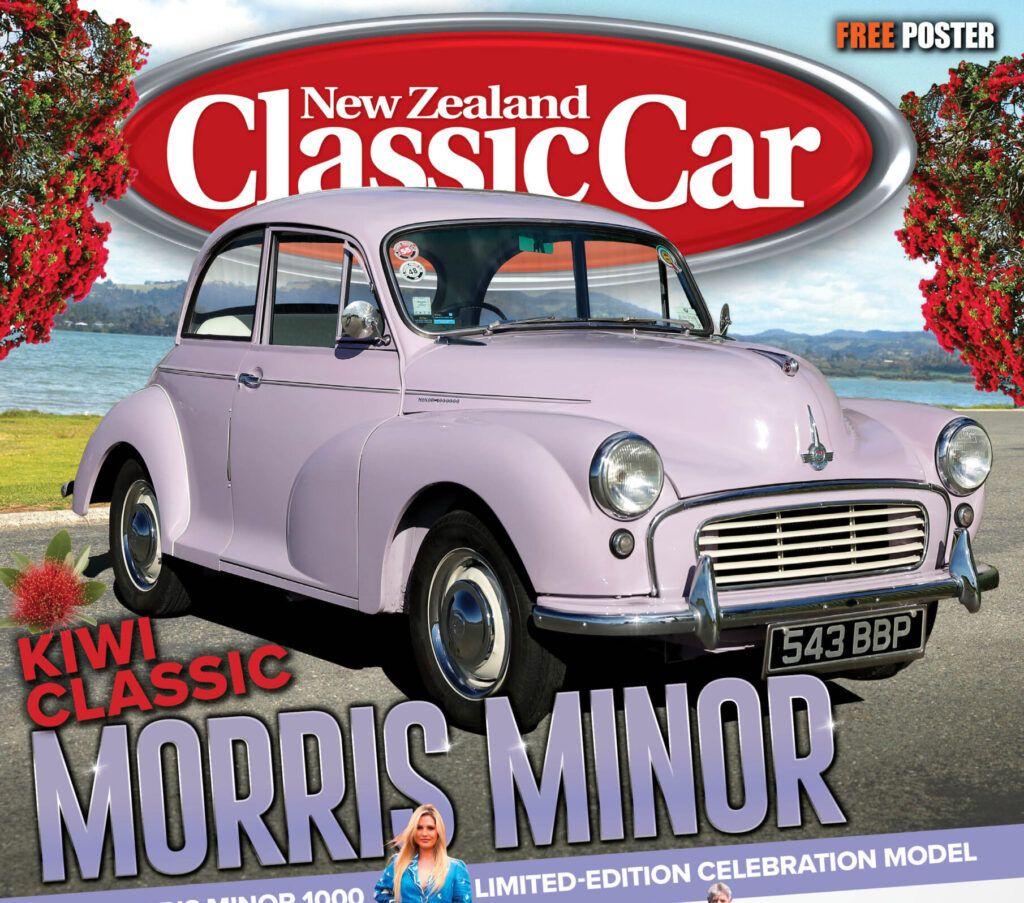
NZ Classic Car magazine, January/February 2026 issue 403, on sale now
Morris’ ground-breaking, world-beating, Minor
It was Britain’s biggest small car, and it got Britain mobile again. Morris Motors celebrated its millionth Minor in December 1960, a car that defined the British motor industry, and was in production for 10 years alongside the iconic Mini of 1959.
Whakatane dentist John Twaddle has a passion for Morris Minors going back to 1982, and he still has his first example. There are now three ‘Morries’ in his garage. One, however, is quite special, a rare ‘Minor-Million’.
One of just 350 made commemorating the millionth Morris Minor produced, the first British car to hit a million units, the well-rounded little Brit’ would end production in 1971with a tally of over 1.6 million units.
John finished his Minor Million six years ago, resplendent in lilac, its official factory colour. He calls it his ‘Minor Resurrection’, and it has won numerous awards.
This summer edition also comes with our annual FREE classic car calendar, a must for every garage wall.
Every issue comes with our FREE huge wall poster; this issue, our poster is of a couple of garage mates, a 1957 Ford Ranchero and a 1968 Lincoln Continental.
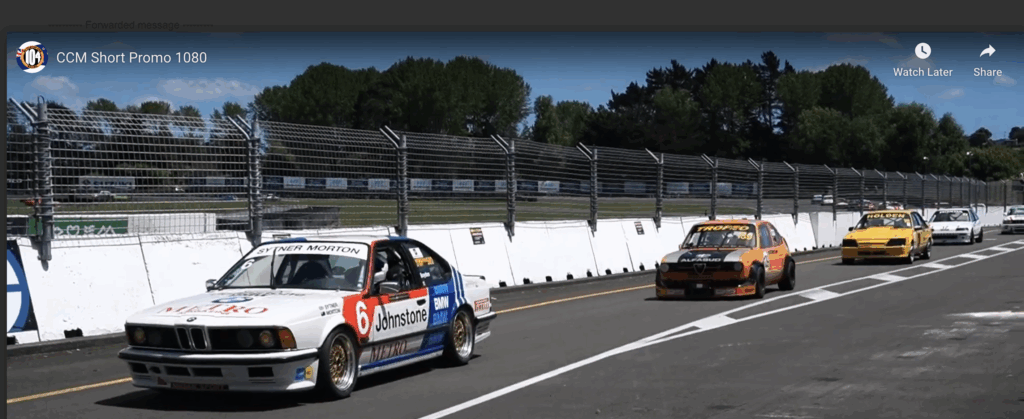
Short intro video of Classic Manfeild, 2025
Check out this taster video of Classic Manfeild 2025
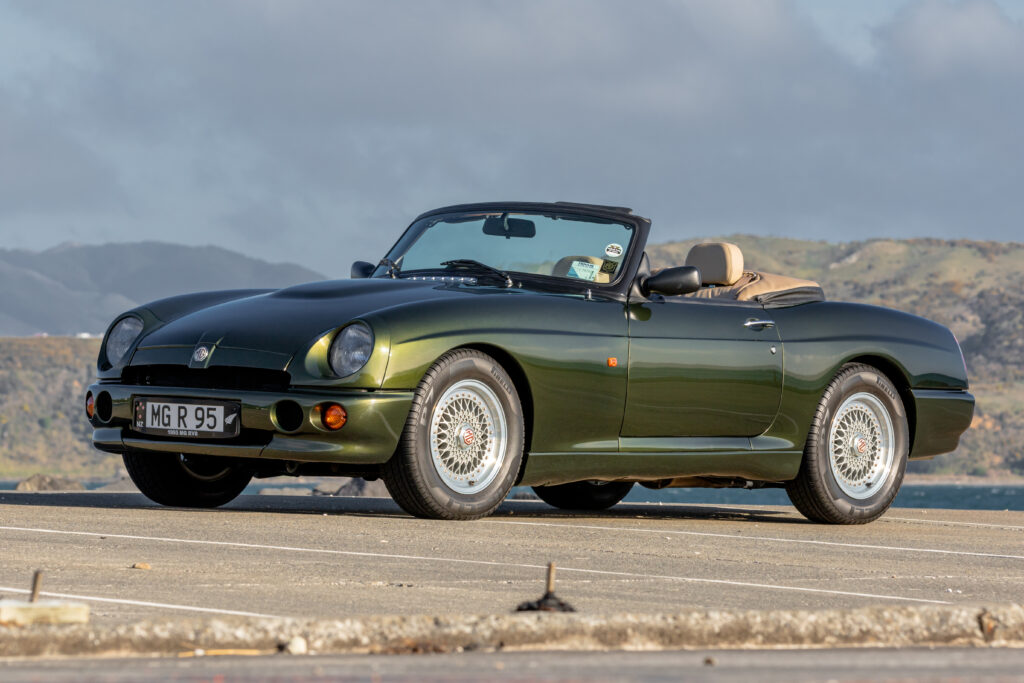
Project Adder – an MGB with bite
Bill and Rae Denize have been active MG Car Club members in Wellington for nearly 32 years. They have held a variety of positions on the club committee, and now that they are both retired, they can be even more involved in the club’s activities. Bill is currently the president of the MG Car Club, Wellington Centre.
The list of cars they’ve owned over the years is testament to their passion for the brand. It includes a 1972 Midget — the round rear-wheel arch model with 1275cc motor; a three-door 2004 MG ZR; a 2005 MG ZR (five-door); and Rae’s 2005 MG TF, which they still own. Bill also raced a 1967 Morris Mini Cooper S at Manfeild for many years. That car featured in an article in the January 2013 issue of this magazine.
In April 2013, Bill sold the Cooper S and decided to buy a low mileage, freshly imported MG RV8 from Japan. He liked the idea as there were only 1983 built in the early 1990s, which, hopefully, would translate into these cars holding their value. More importantly, their bodies were galvanised, which meant fewer rust problems, although Bill and Rae didn’t escape encounters with oxidation unscathed.
Content categories
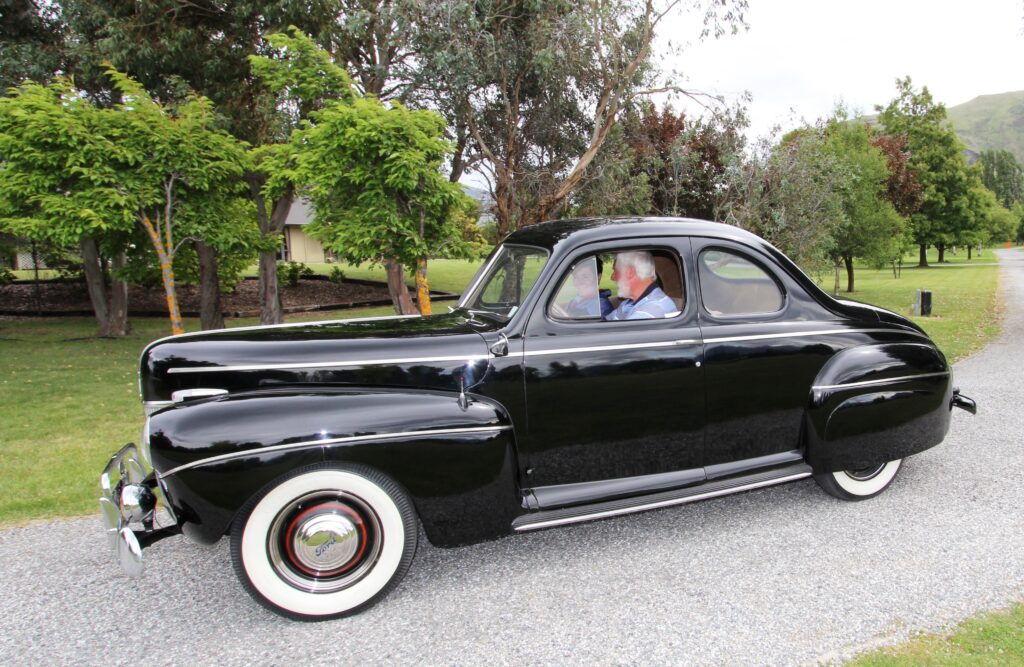
The originals – the Ledgerwood Collection
Thanks to Central Otago’s dry climate, it’s no surprise to find that Wanaka couple Jim and Daphne Ledgerwood are steadily developing an incredible collection of amazing coupes. ‘The Originals’ they have are as per factory new condition, and their aim is to keep them for everyone to see how it was done back in the day—pure nostalgia.
An occasional email from Jim usually reveals another gleaming addition. The collectors also have an impressive display of American pickups. It’s our gain and US enthusiasts’ loss, as car agent’s adverts proclaim, “Sorry you missed out. Gone to New Zealand!” Some of Jim and Daphne’s cars are almost part of the family, hence their nicknames.
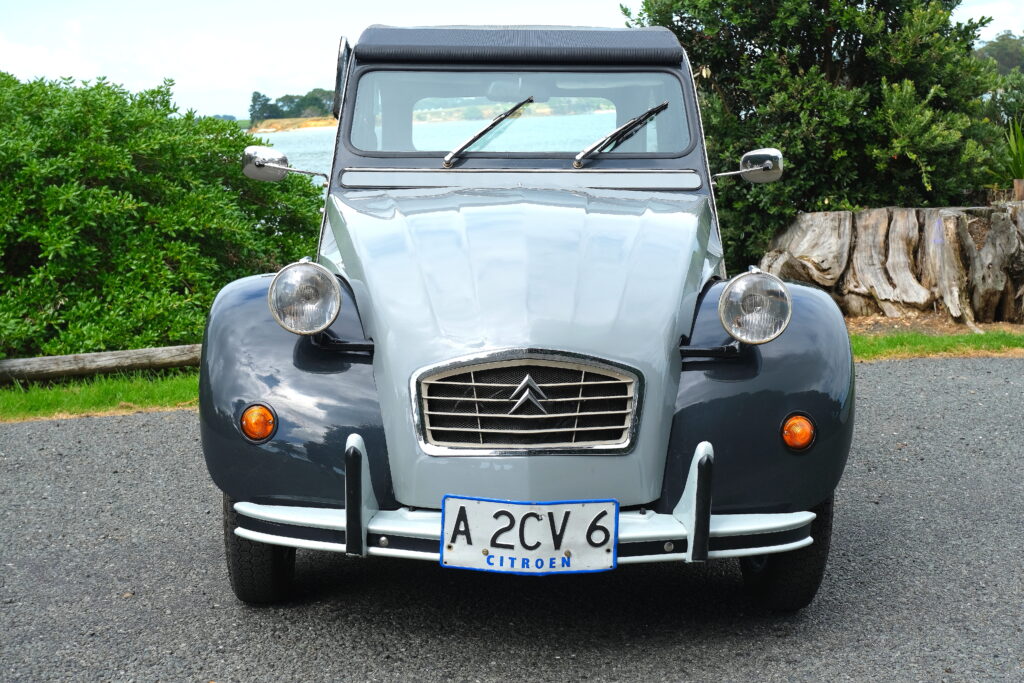
1985 Citröen 2CV6 Charleston
Kerry describes it as ‘a very simple car to do’. The suspension can be set to the required ride height. It is essential to weigh each corner to avoid too much weight difference from side to side. The four-speed gearbox was re-built. They are prone to getting a little water in them if not serviced correctly. Water etches into the bearings. The main shaft was also replaced.
But as it was a reasonably high mileage car, Kerry expected a few mechanical issues.
“The lady I bought it off owned it from 900km after it had been sold new to a gentleman in Palmerston North. He found he couldn’t fit into it. This woman in Hamilton bought it and she had run it to a total of 101,000kms. It was brand new in 1985 so it’s done quite a few kilometres for a little car.”
Not surprisingly, these little cars grow on their owners and the previous lady owner is now interested in buying it back.
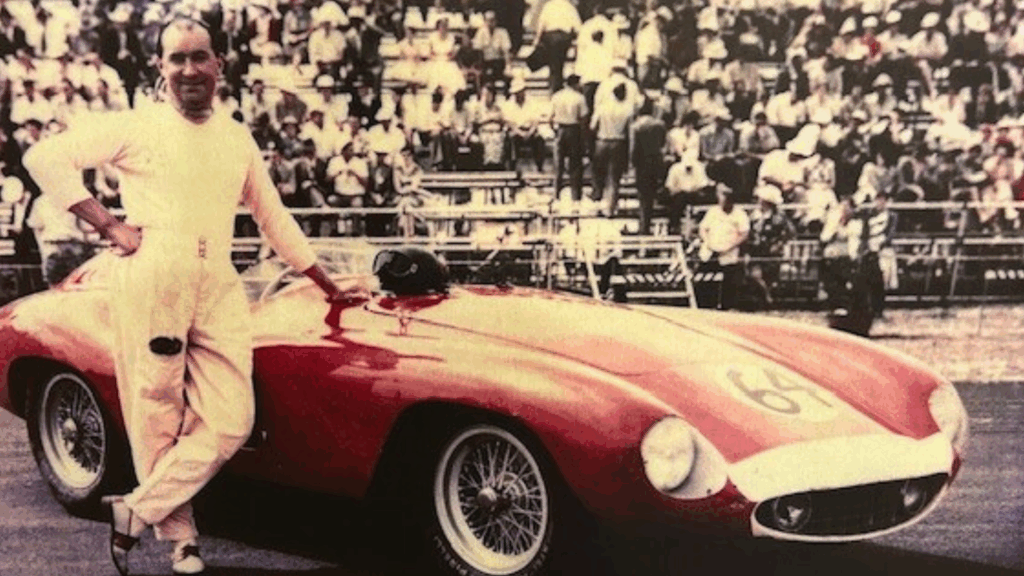
A Legend Returns
The Ayrburn Classic, one of the most anticipated motoring events on the New Zealand calendar, is set to take things up a gear in 2026 with a line-up that promises to captivate enthusiasts and the general public alike. Following the success of the inaugural event, the Ayrburn Classic returns with a recently confirmed feature that is nothing short of extraordinary: the historic Ferrari Monza 750 – a masterpiece of motorsport and one of the most significant vehicles to race on New Zealand soil.
Legendary status
This particular Ferrari Monza 750, which arrived in New Zealand in 1957 and has remained here ever since, holds a legendary status in motorsport history. It competed in the Mille Miglia, Le Mans, and the Targa Florio – the ‘Big Three’ of European endurance racing during the golden era of the sport. Few cars can claim such provenance, and even fewer have such a deep and poignant connection to New Zealand’s own racing legacy.
Tragically, the Ferrari Monza 750 was involved in a fatal accident at Ardmore in 1957, marking the final moments of British driver Ken Wharton, whose last photograph was taken next to this very car. The vehicle has since been meticulously preserved, with images from the aftermath of the crash etched in motorsport history. Today, it stands as a symbol of both the bravery of that era and the enduring beauty of Italian automotive craftsmanship.
Content categories

Double duties for Brendon Leitch in fifth Lamborghini World Finals
Brendon Leitch will have six shots at victory at Misano when the Lamborghini Super Trofeo season comes to a close.
Leitch will finish his Lamborghini Super Trofeo Asia season with China’s JJ Song and Leipert Motorsport in the Pro-Am class.
The New Zealander has also been drafted in for the Lamborghini Super Trofeo Europe final with Australia’s Nicolas Stati in another Pro-Am entry by Leipert Motorsport.
The final rounds of the Asia and Europe series take place across November 6-7 before the Lamborghini World Finals on November 8-9.
The three regional series – Europe, Asia, and North America – finish their respective championships before combining grids for the World Finals.
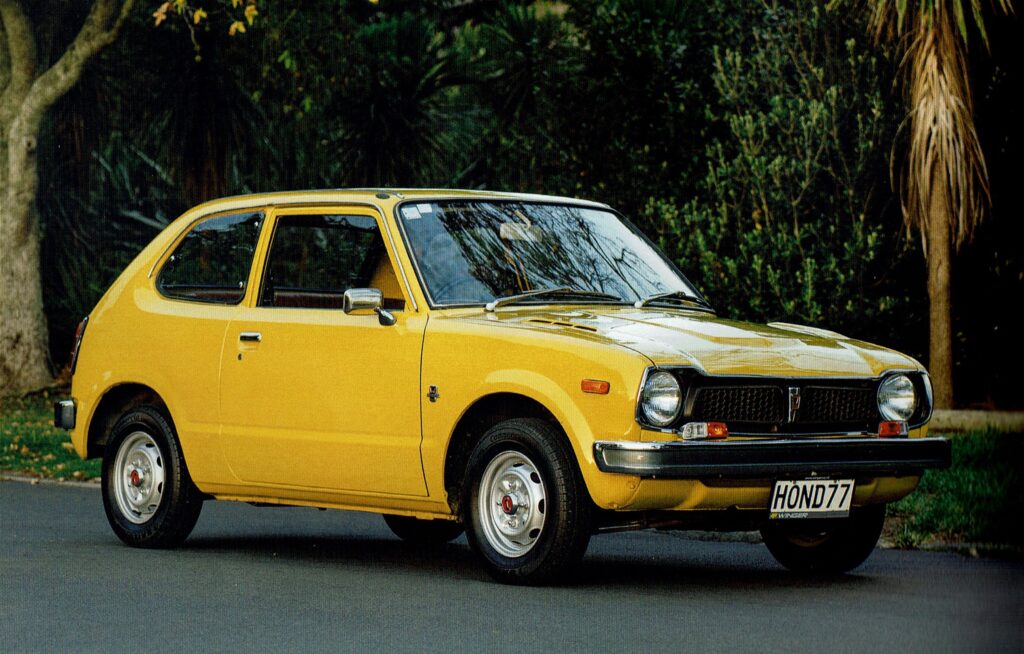
Honda’s game-changing EB1 Civic
Japanese cars, and Hondas in particular, were about to flourish in New Zealand. This was the crux of the conversation I was having with Russell Moller, sitting in his Greenlane, Auckland, motor dealership early in 1973. Russell was particularly excited about the new Civic EB1 small car that had been unveiled in Japan the previous year.
I was about to leave on an extended stay in Britain. When I returned more than two years later, it was apparent Russell had called it right. Norton and Russell Moller had gained the licence to import fully built up Hondas, and formed Honda Pacific. A few highly prized Civics arrived before the New Zealand Motor Corporation (NZMC) assumed the franchise from the Moller Group. The corporation’s plans included building the EB1 at NZMC’s plant at Petone, near Wellington, and the first CKD (completely knocked down) Civic, a bright yellow example, rolled off the local assembly line in March 1976.
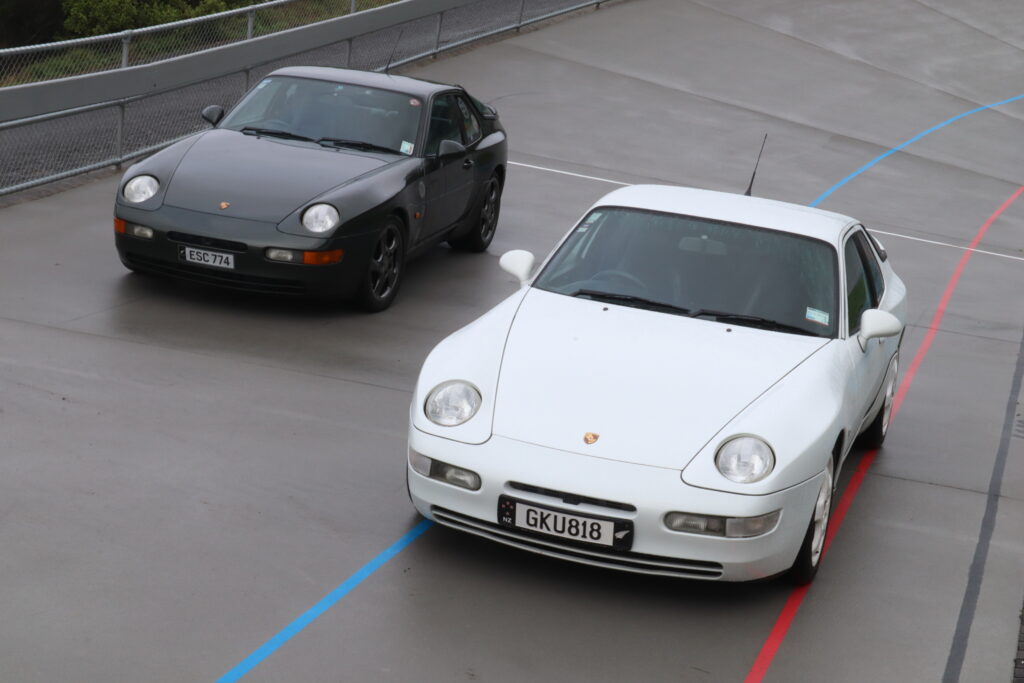
Brothers in arms
When you think Porsche, you will often think of the 911 or 356 — both rear-engine, both air-cooled (or at least until more recent times for the 911), and both icons of the sports car world. The 356 is very desirable, in hardtop coupe or in one of the three topless derivatives — speedster, roadster or cabriolet. Similar to larger car firms, Porsche experimented with a cheaper entry-level car for the keen but more modest income prospective purchasers so they could obtain their first foray into the brand.
Reaching back to their roots, Porsche collaborated with Volkswagen and released the mid-engine 914 in 1969. It sold in significant numbers in the USA, and was a modest success.
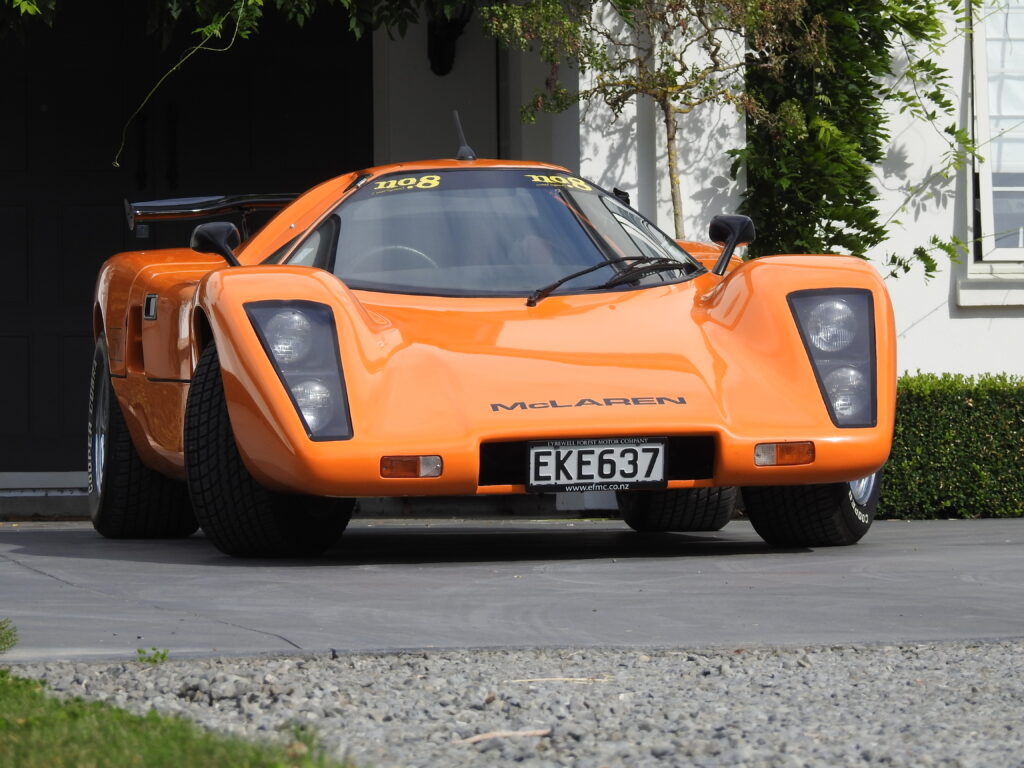
Mararn – New Zealand’s only production McLaren
I met Andrew Farrow in the little South Island town of Rangiora, where he introduced me to the then current version of his constantly changing car collection. He owns the Eyrewell Forest Motor Company. Not having a forecourt, his sales generally occur online where he buys and sells cars to add to his fluid collection. An example of what I mean by fluid is the F-Type Jaguar which he purchased recently and enjoys driving. It is advertised on his website and will eventually sell, at which point it will be replaced by another exotic he would like to own such as a Ferrari 599. Consequently, his collection is always in a state of flux, and he never has time to get bored with a particular car as another car will always be somewhere on the horizon.
I had gone to see one of the more permanent cars in his collection and one of his favourites, a McLaren M6GT replica. “It’s not the fastest or most expensive car here,” says Andrew, “but it does get the most attention.”
Anybody who knows about cars will instantly recognise this car as being a replica of the McLaren M6GT, conceived by Bruce McLaren as having the potential to be the first McLaren road-legal supercar, conceived decades before the McLaren F1.
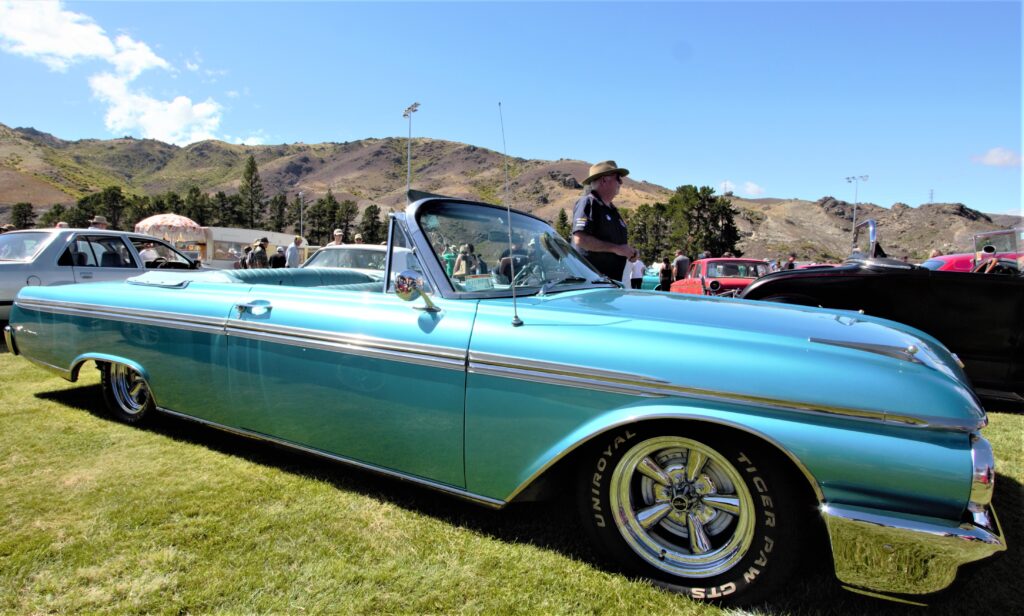
Big jump at Cromwell
Kicking off the event, the Alpine Street Machines’ Friday cruise to Bannockburn and back on the Friday was easily the biggest in the event’s history. Some 380 cars created a wondrous spectacle for unsuspecting fellow road users that day, potentially tempting some to take a closer look in Cromwell over the weekend.
Saturday’s car show, organised by the Southland Ford Falcon Club at the Alpha St reserve, drew perhaps a thousand or more gleaming examples of interesting cars and applied restoration skills. Chrome and flashing paintwork dazzled the eye in the bright Central Otago light everywhere you looked. It really looked as if everyone with a classic or a hot rod from across the island had seen the forecast for great weather and headed for Central Otago.
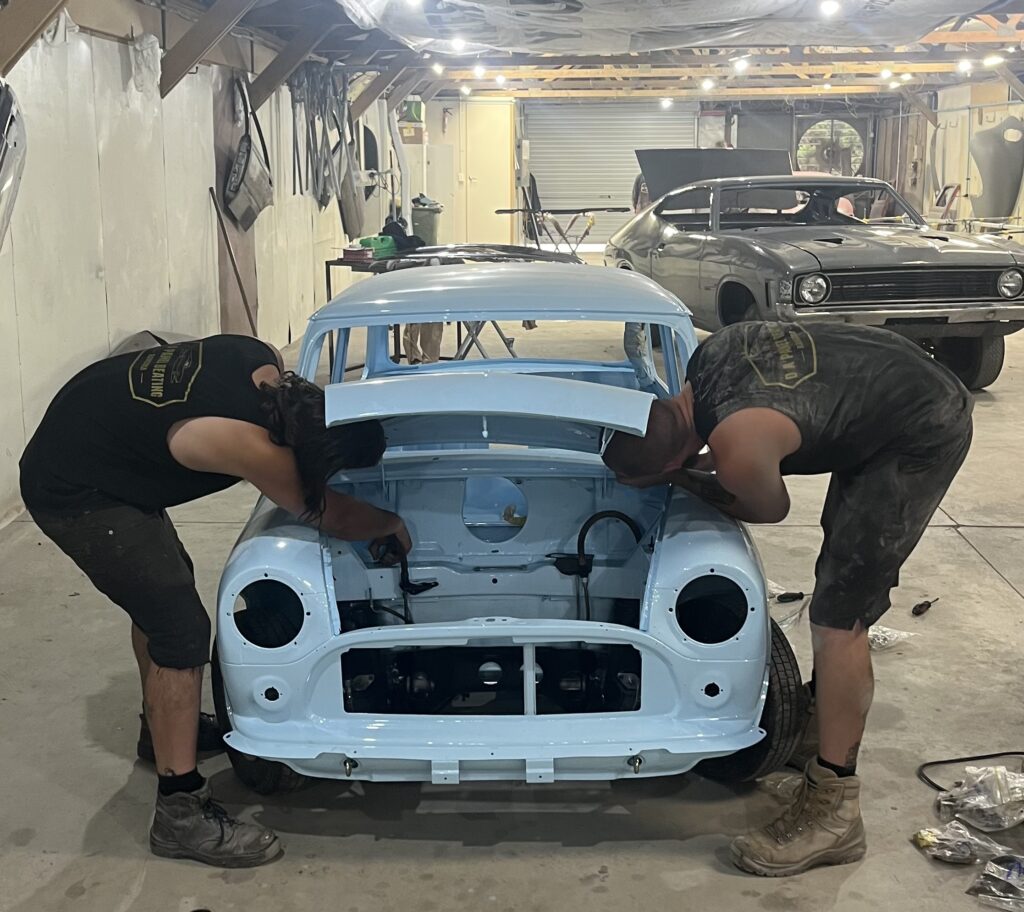
A passion for classics and customs
In the highly competitive field of New Zealand classic and custom restorations, reputations are won or lost on the ability to maintain consistently high standards of workmanship. A company managing to achieve this is D A Panel beating Ltd, of Rangiora near Christchurch. Is your classic or custom car restoration stalled, or in need of a refresh, or perhaps you are looking for experts to rebuild that recent import project out of Europe or the ‘States?
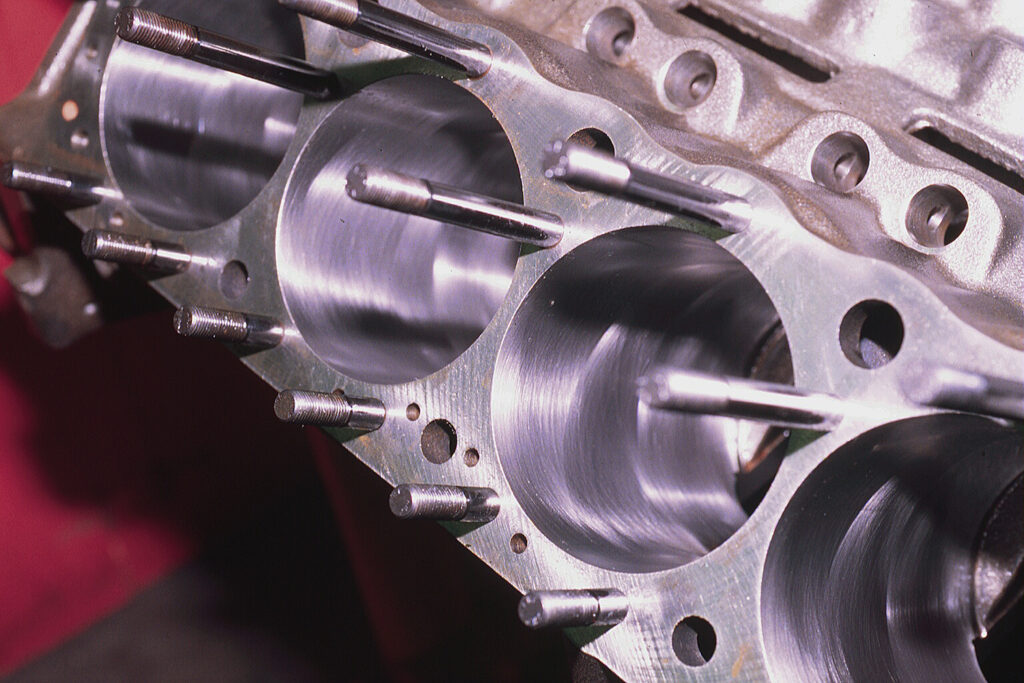
Blueprinting basics
You occasionally hear petrol heads tossing around the term ‘blueprinting’ when referring to an engine they have assembled, and have sometimes altered significantly. What they are probably trying to say is that their engine was carefully machined to optimum tolerances and balanced — probably for racing. But that isn’t what the term meant originally. You see, in the 1950s, when US stock car race cars really had to be stock, the racing teams would go to the factories and rummage through the parts bins until they found components that were closest in tolerance to the original blueprint developed by the engine’s designers.
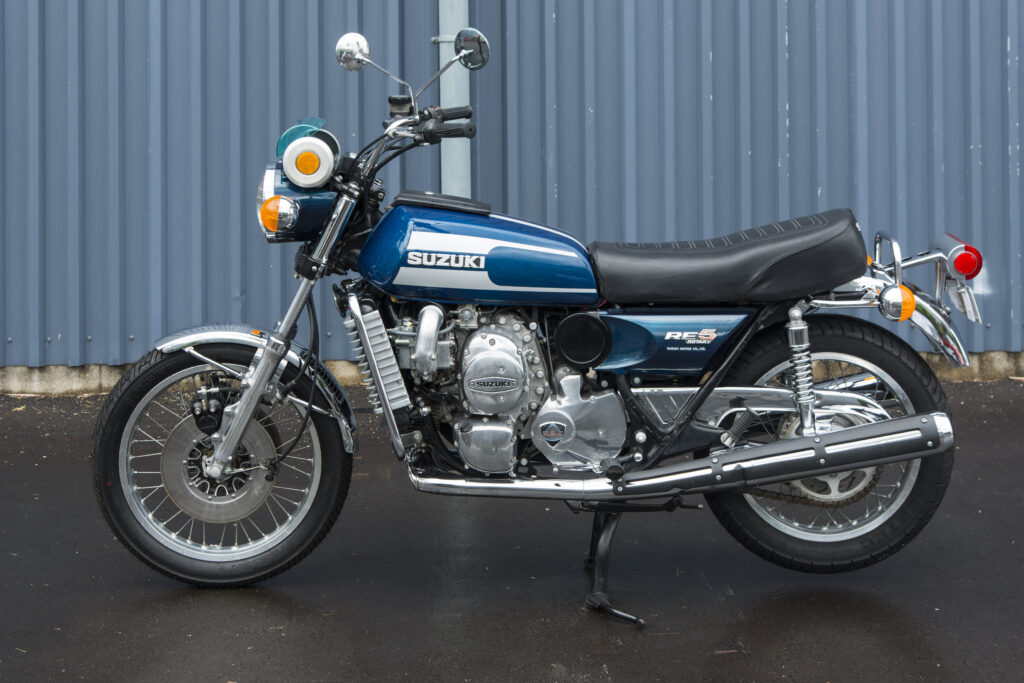
1975 Suzuki RE5
Suzuki had high hopes for its RE5 Wankel-engined bike launched in 1975. It had started looking at the Wankel engine in the mid-60s and bought the licence to the concept in 1970.
Apparently all of the big four Japanese makers experimented with the design, Yamaha even showing a rotary-engined bike at a motor show in 1972. But Suzuki was the only one of the big four to go into production. Like many others at the time, Suzuki believed that the light, compact, free-revving Wankel design would consign piston engines — with their complex, multiple, whirring valves and pistons, which (can you believe it?) had to reverse direction all the time — to history.
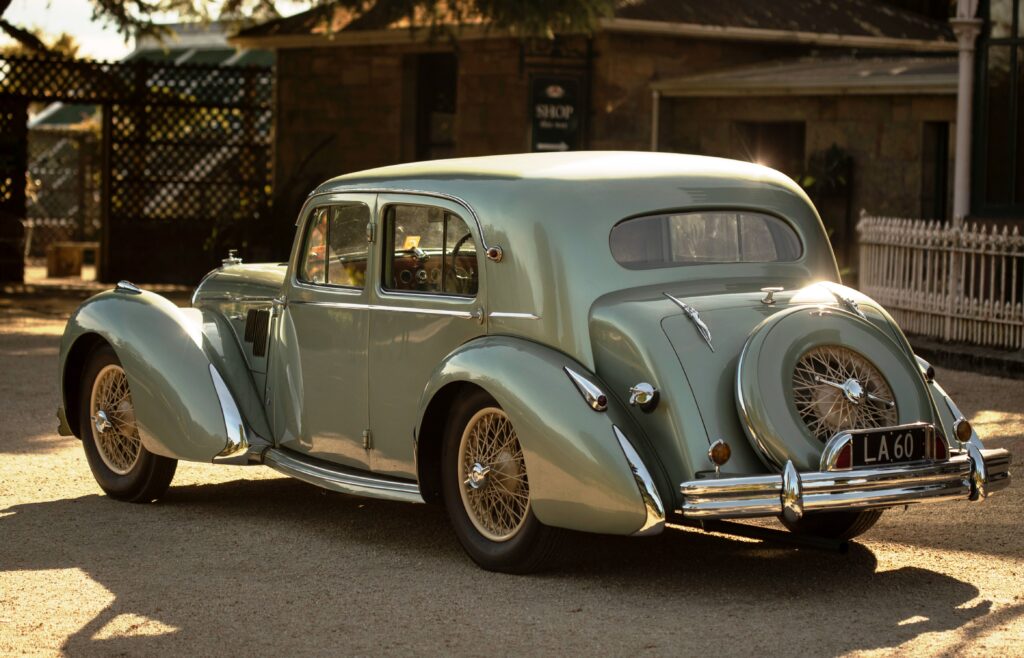
Grand Routier — in the french tradition
Sitting in Paddy and Patsy Williams’ Dunedin garage is a stunning example of one of these rare French grand routier sedans. It is a 1949 four-door Lago-Record Factory Berline sedan, to give its full name. Daughter Cath let us know how proud she was of her dad, who had been tinkering away in his garage on this car for so many years.
Without exaggeration, it has been a mammoth task. I first saw this Talbot-Lago in mid 2019. The long-nosed, sweeping, curved four-door saloon, clothed in its misty green metallic paint, was quite breathtaking. There’s more than a little English influence in it, too, harking back to company owner Tony Lago’s involvement in the Clement-Talbot-Darracq era. The long front wings and bonnet, usually multi-louvred, highlighted with artful touches of chrome bling, are typical of the era, but these were indeed luxury length. Interiors provided leather-clad, armchair-style seating and ample legroom, with touches of wood and surprising details such as dainty childproof interior locks — a far cry from today’s lozenge boxes.
Paddy, a retired civil and structural engineer, knows his way around a lathe. He has a well-equipped garage-workshop to assist in any machining tasks along with his other passion for restoring classic motorcycles.

